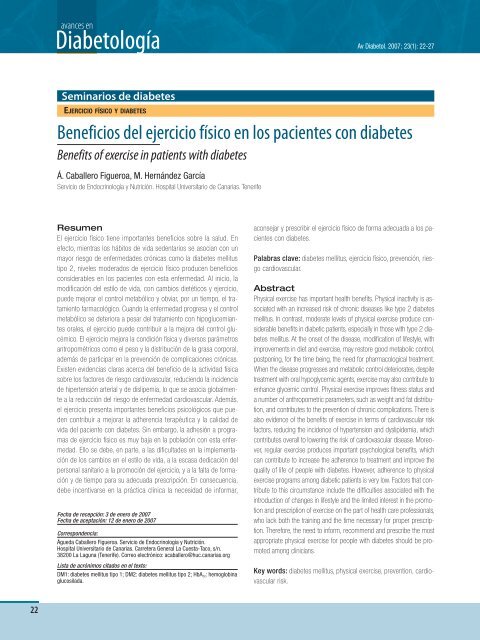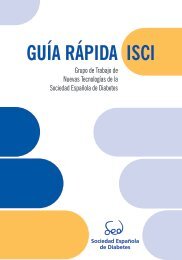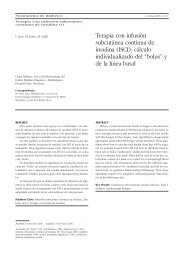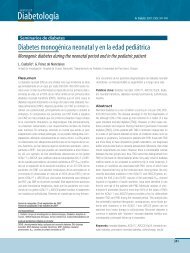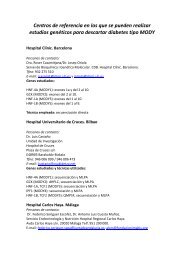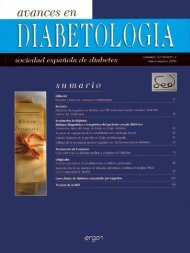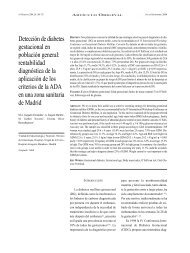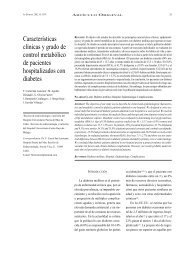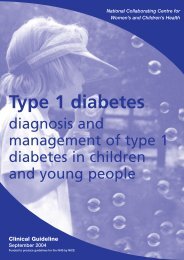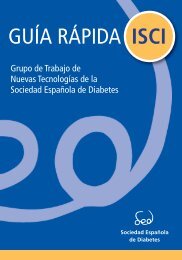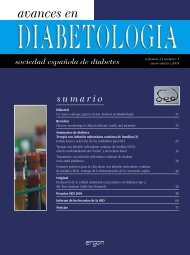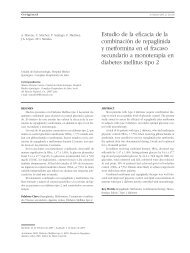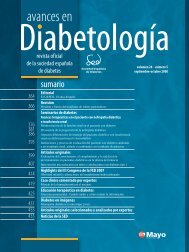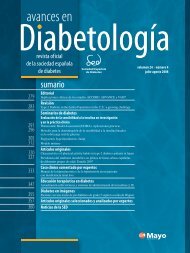00A PORT Y LOMO AVA.indd - Sociedad Española de Diabetes
00A PORT Y LOMO AVA.indd - Sociedad Española de Diabetes
00A PORT Y LOMO AVA.indd - Sociedad Española de Diabetes
Create successful ePaper yourself
Turn your PDF publications into a flip-book with our unique Google optimized e-Paper software.
avances en<br />
Diabetología<br />
Av Diabetol. 2007; 23(1): 22-27<br />
Seminarios <strong>de</strong> diabetes<br />
EJERCICIO FÍSICO Y DIABETES<br />
Beneficios <strong>de</strong>l ejercicio físico en los pacientes con diabetes<br />
Benefits of exercise in patients with diabetes<br />
Á. Caballero Figueroa, M. Hernán<strong>de</strong>z García<br />
Servicio <strong>de</strong> Endocrinología y Nutrición. Hospital Universitario <strong>de</strong> Canarias. Tenerife<br />
Resumen<br />
El ejercicio físico tiene importantes beneficios sobre la salud. En<br />
efecto, mientras los hábitos <strong>de</strong> vida se<strong>de</strong>ntarios se asocian con un<br />
mayor riesgo <strong>de</strong> enfermeda<strong>de</strong>s crónicas como la diabetes mellitus<br />
tipo 2, niveles mo<strong>de</strong>rados <strong>de</strong> ejercicio físico producen beneficios<br />
consi<strong>de</strong>rables en los pacientes con esta enfermedad. Al inicio, la<br />
modificación <strong>de</strong>l estilo <strong>de</strong> vida, con cambios dietéticos y ejercicio,<br />
pue<strong>de</strong> mejorar el control metabólico y obviar, por un tiempo, el tratamiento<br />
farmacológico. Cuando la enfermedad progresa y el control<br />
metabólico se <strong>de</strong>teriora a pesar <strong>de</strong>l tratamiento con hipoglucemiantes<br />
orales, el ejercicio pue<strong>de</strong> contribuir a la mejora <strong>de</strong>l control glucémico.<br />
El ejercicio mejora la condición física y diversos parámetros<br />
antropométricos como el peso y la distribución <strong>de</strong> la grasa corporal,<br />
a<strong>de</strong>más <strong>de</strong> participar en la prevención <strong>de</strong> complicaciones crónicas.<br />
Existen evi<strong>de</strong>ncias claras acerca <strong>de</strong>l beneficio <strong>de</strong> la actividad física<br />
sobre los factores <strong>de</strong> riesgo cardiovascular, reduciendo la inci<strong>de</strong>ncia<br />
<strong>de</strong> hipertensión arterial y <strong>de</strong> dislipemia, lo que se asocia globalmente<br />
a la reducción <strong>de</strong>l riesgo <strong>de</strong> enfermedad cardiovascular. A<strong>de</strong>más,<br />
el ejercicio presenta importantes beneficios psicológicos que pue<strong>de</strong>n<br />
contribuir a mejorar la adherencia terapéutica y la calidad <strong>de</strong><br />
vida <strong>de</strong>l paciente con diabetes. Sin embargo, la adhesión a programas<br />
<strong>de</strong> ejercicio físico es muy baja en la población con esta enfermedad.<br />
Ello se <strong>de</strong>be, en parte, a las dificulta<strong>de</strong>s en la implementación<br />
<strong>de</strong> los cambios en el estilo <strong>de</strong> vida, a la escasa <strong>de</strong>dicación <strong>de</strong>l<br />
personal sanitario a la promoción <strong>de</strong>l ejercicio, y a la falta <strong>de</strong> formación<br />
y <strong>de</strong> tiempo para su a<strong>de</strong>cuada prescripción. En consecuencia,<br />
<strong>de</strong>be incentivarse en la práctica clínica la necesidad <strong>de</strong> informar,<br />
Fecha <strong>de</strong> recepción: 3 <strong>de</strong> enero <strong>de</strong> 2007<br />
Fecha <strong>de</strong> aceptación: 12 <strong>de</strong> enero <strong>de</strong> 2007<br />
Correspon<strong>de</strong>ncia:<br />
Águeda Caballero Figueroa. Servicio <strong>de</strong> Endocrinología y Nutrición.<br />
Hospital Universitario <strong>de</strong> Canarias. Carretera General La Cuesta-Taco, s/n.<br />
38200 La Laguna (Tenerife). Correo electrónico: acaballero@huc.canarias.org<br />
Lista <strong>de</strong> acrónimos citados en el texto:<br />
DM1: diabetes mellitus tipo 1; DM2: diabetes mellitus tipo 2; HbA 1c : hemoglobina<br />
glucosilada.<br />
aconsejar y prescribir el ejercicio físico <strong>de</strong> forma a<strong>de</strong>cuada a los pacientes<br />
con diabetes.<br />
Palabras clave: diabetes mellitus, ejercicio físico, prevención, riesgo<br />
cardiovascular.<br />
Abstract<br />
Physical exercise has important health benefi ts. Physical inactivity is associated<br />
with an increased risk of chronic diseases like type 2 diabetes<br />
mellitus. In contrast, mo<strong>de</strong>rate levels of physical exercise produce consi<strong>de</strong>rable<br />
benefi ts in diabetic patients, especially in those with type 2 diabetes<br />
mellitus. At the onset of the disease, modifi cation of lifestyle, with<br />
improvements in diet and exercise, may restore good metabolic control,<br />
postponing, for the time being, the need for pharmacological treatment.<br />
When the disease progresses and metabolic control <strong>de</strong>teriorates, <strong>de</strong>spite<br />
treatment with oral hypoglycemic agents, exercise may also contribute to<br />
enhance glycemic control. Physical exercise improves fi tness status and<br />
a number of anthropometric parameters, such as weight and fat distribution,<br />
and contributes to the prevention of chronic complications. There is<br />
also evi<strong>de</strong>nce of the benefi ts of exercise in terms of cardiovascular risk<br />
factors, reducing the inci<strong>de</strong>nce of hypertension and dyslipi<strong>de</strong>mia, which<br />
contributes overall to lowering the risk of cardiovascular disease. Moreover,<br />
regular exercise produces important psychological benefi ts, which<br />
can contribute to increase the adherence to treatment and improve the<br />
quality of life of people with diabetes. However, adherence to physical<br />
exercise programs among diabetic patients is very low. Factors that contribute<br />
to this circumstance inclu<strong>de</strong> the diffi culties associated with the<br />
introduction of changes in lifestyle and the limited interest in the promotion<br />
and prescription of exercise on the part of health care professionals,<br />
who lack both the training and the time necessary for proper prescription.<br />
Therefore, the need to inform, recommend and prescribe the most<br />
appropriate physical exercise for people with diabetes should be promoted<br />
among clinicians.<br />
Key words: diabetes mellitus, physical exercise, prevention, cardiovascular<br />
risk.<br />
22


